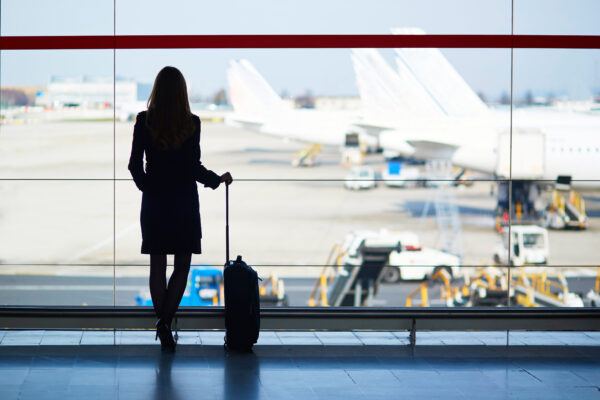Travelling

Going on holiday gives us the opportunity to relax, to be with family, friends and acquaintances, to be together and share new experiences. But holidaying at home and abroad, or staying in a strange place, can be stressful (even when you have good hearing). With hearing loss, it can be even more challenging.
Here are a few things that can happen:
- Mishearing announcements on busy train stations and in airports
- Asking directions from strangers
- Missing vital information announced by the tour guide
- Trying to lipread a foreign language – even when you know the language well
- Trying to communicate in a busy, noisy restaurant or venues
- Taking your hearing aids or cochlear implants out to swim and realising that you cannot hear when the attendant tells you to leave the pool
- Going on an expensive guided tour and not understanding a word.
However, a little forethought can make things easier.
| Making your booking | Hearing aids and equipment | At the hotel | When you are out and about |
|---|---|---|---|
| Make your holiday booking online if possible as all confirmation will be in writing. | Have your hearing aids/cochlear implant checked by the audiology department before you leave on holiday. | Remind hotel staff that you will not:
| Carry a small notebook and pen so that directions from strangers can be written for you or use a memo pad that offers an environmentally friendly alternative. |
| Ask for everything to be confirmed in writing – price, dates, bookings and travel arrangements. | Take any equipment you need with you e.g. vibrating alarm clock, door beacon, portable telephone amplifier, television listening device and smoke alarm. Take an adapter. | Restaurants are often quieter if you go for a very early, or a very late, lunch. | Learn the phrase ‘I am deaf’ in the language of the country you are visiting or have it written on a card, and translater a few communication tactics into the language of the country as well. |
| Make sure you know your travel arrangements clearly in advance – timetable, changes of train or plane, locations of airports, stations and coach pick-up points. | Pack spare hearing aid batteries. | Wear a badge to alert others to your communication and hearing needs, such as the ‘I’m a lipreader’ badge or ‘I have hearing loss and I lipread’ badge. | Download useful apps such as the LiveTranscribe speech to text app for use at the airport or if you are holidaying in the UK. |
| Find out if the hotel has any provision for hard of hearing and deaf people before you book with them e.g. visible or tactile smoke alarm, subtitled television. | Carry a simple hearing aid care products such as ear mould puffer, tubing, vent cleaner, wet wipes, or drying box (if you use one). | Don’t be afraid to ask professionals, such as tour guides, for help if you need it. | Take maps – it is difficult to hear people’s instructions but if you have a map they can show you the way. |
| Self-catering can provide you with privacy and less background noise for meal times. | Check with your mobile phone provider that you will be able to send text messages from your mobile telephone from abroad (roaming enabled). | Invest in a good guide book – that way you will not have to rely on other people telling you things – or take maps and information on your smart-phone or tablet. | |
| Make sure any travelling companion knows the extent of your deafness and give them a few deaf awareness instructions beforehand or tools such as ‘I am with someone who lipreads’ companion badge. | If you’re flying, you may find EarPlanes useful. If you are a keen swimmer, consider BioEars for keeping water out your ears while swimming, or Clear Ears which removes water after swimming. | Your travelling companions are on holiday too – do not use them as ‘interpreters’ unless really necessary. Try to be as independent as possible. | |
| Also available in the our Online Shop, consider using a Personal Awareness Kit as your holiday companion packed full of useful communication tools and resources. | Tell people that you have a hearing loss in advance and be clear about what you need. |
Travelling by plane
Whether you’re going on a business trip or off on holiday abroad or at home, take a bit of time to prepare for your flight. For example, let the airline know your needs in advance – explaining clearly the help you require and that you cannot hear announcements.

Other do’s and don’ts:
- Check out ABTA’s checklist for travellers with disabilities
- Request that the assistance you require is confirmed in writing on your ticket or itinerary
- Most airports have induction loops, public textphones and public amplified telephones
- A member of the airport staff may escort you to your plane along with other disabled passengers
- Tell the cabin staff on the plane that you have a hearing loss
- The staff may have Deaf Awareness Training or a qualification in British Sign Language
- They may be able to provide the health and safety instructions and general information in writing for you
- Your hearing dog should be allowed to travel in the plane with you and free of charge – remember that your dog should have its passport and vaccinations too!
Many airports now offer special assistance and if you or a loved one has hearing loss you can request to utilise this service. the Civil Aviation Authority website has more information about how to access this service: www.caa.co.uk/specialassistance
Airlines such as British Airways and Virgin Atlantic, have special assistance departments to look after the needs of disabled passengers. Please check with your airline before travelling what types of support are available.
Airport Parking Shop did some research on seven of the top UK Airports. Read their blog about using airports if you have a hearing loss.
Travelling by train

If you find changing trains and hearing announcements difficult, National Rail staff can provide help via their Assisted Travel Service.
- Contact the train company that manages your local station at least 24 hours in advance of your journey
- Request the exact help you will need e.g. changing trains at Chester
- Give specific details of your needs when booking your journey
- Visit National Rail Enquiries Information for Disabled Passengers
Disabled Persons’ Railcard
- Save train fares for you and a companion
- Visit Disabled Person’s Railcard
Webpage updated: February 2024
